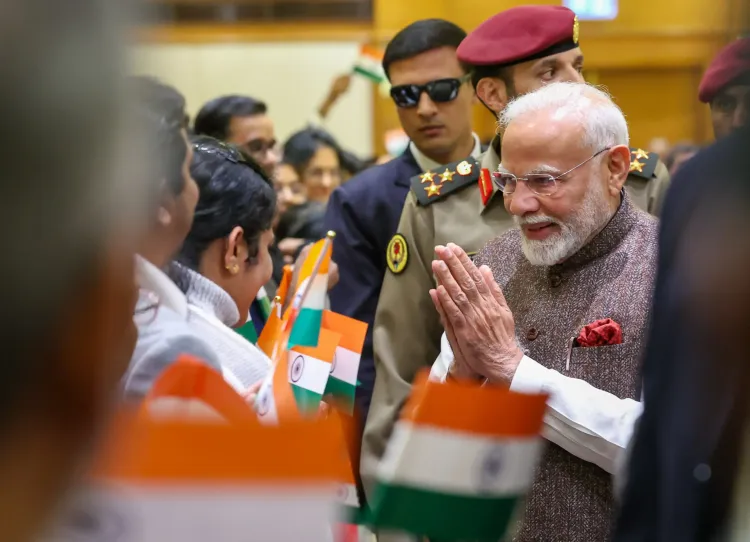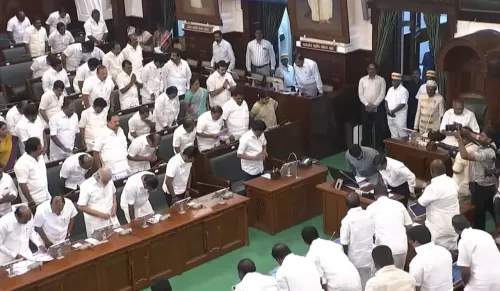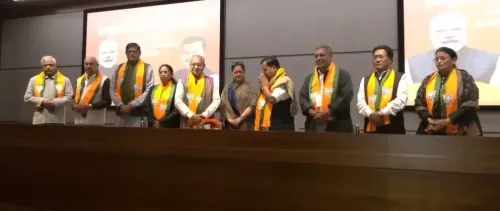The Third Eye: Promoting Effective Governance

New Delhi, Dec 22 (NationPress) It is encouraging to observe that the Centre is actively involved -- chiefly through the Economic Advisory Council of the Prime Minister -- in tackling issues that hinder an effective and public-oriented ‘delivery’ by the government machinery.
A broad definition of ‘efficiency’ that applies universally is that it is ‘a measure of productivity per unit of resource -- money, manpower, or time’. Therefore, any measure that enhances the cost-effectiveness of a process without negatively affecting the outcome will also increase its efficiency. The concept of ‘ease of doing business’ has rightly become a benchmark for evaluating the performance of those occupying decision-making roles within the Ministries. The government is addressing bureaucratisation by abolishing outdated and irrelevant laws and regulations, streamlining implementation timelines, and redefining accountability across various levels of the hierarchy.
There is much work to be done in this area, and the government deserves recognition for initiating this effort. Reforming governance is a ‘task’ best suited for individuals with the necessary expertise and interest -- such as those in significant positions within empowered organizations like Niti Ayog and the Economic Advisory Council, who possess an insider’s perspective on governance. Traditionally, Administrative Reforms Commissions were established, which -- based on historical evidence -- used their autonomy merely to delay the production of numerous reports filled with generalities. These commissions identified few deficiencies and rarely articulated practical solutions. The significance of both ‘structure’ and ‘process’ reforms has gained increased attention since Donald Trump, the President-elect in the US, announced that Elon Musk would lead a Government Efficiency Commission to enhance governance in the democratic state.
For governance in India to improve in terms of the services it offers to its citizens, three key actions must be undertaken: ensuring prompt implementation of decisions, establishing built-in systemic safeguards against delays in ‘delivery’ caused by inefficiency or neglect, and implementing robust measures to combat corruption. To create the right environment, it is crucial to eliminate laws and regulations that have become obsolete due to their origins in colonial frameworks or because they have become entirely redundant in our new age of communication and refined legal obligations. A comprehensive review of the institutional entities within the government and ‘autonomous’ bodies under the Centre is necessary to assess their modern utility and purpose, leading to required changes such as closures, organizational restructurings, and mergers. Moreover, the acceleration of ‘digitisation’ has become an urgent call for governance reform -- particularly essential for an emerging economic power like India. Thankfully, the current regime is making significant strides in this respect. Online operations -- while ensuring security -- have emerged as a powerful tool for efficiency, achieving cost-effectiveness through time and manpower savings as a ‘resource’, and providing operational knowledge for enhancing expertise.
Recently, during a media event, Sanjeev Sanyal, a member of the Economic Advisory Council of the Prime Minister, emphasized the ‘nuts & bolts’ reforms being implemented to foster efficient governance. He differentiated between ‘structural’ and ‘process’ reforms, elaborating on how the latter are being prioritized -- from eliminating numerous colonial-era laws like Labelling laws and the Weights and Measures Act to disbanding defunct organizations that continued to operate as ‘autonomous’ bodies despite lacking purpose. He noted that the online processing of matters requiring clearance from multiple Ministries within a stipulated timeframe is already contributing to the ease of doing business.
The substantial bureaucratisation in India has always posed challenges to the swift delivery of project work, and the attention the Modi government is giving to the necessary reforms in governance will be greatly appreciated by informed citizens. The push for ‘Digital India’ was indeed timely, and it has already facilitated the advancement of the Indian economy in an intensely competitive global environment, while also ensuring that India can function as a welfare state through ‘direct transfer’ of financial assistance to those in need. Digitisation will help realize the concept of ‘minimum government, maximum governance’, which implies a need for a streamlined bureaucracy where each member of the administrative hierarchy has clearly defined empowerment and accountability.
At the macro level, the notion of ‘process reforms’ appears promising, and it is hoped that the results will manifest soon. The goal of these reforms is to transform bureaucracy into a people-centric, less corruptible, and performance-driven entity -- which will necessitate a robust supervision system where any significant failure or neglect of duty at any level is partially attributed to the immediate supervisor. This principle should extend to the top of the hierarchy. Previously, there was a noticeable trend among senior officers of All India Civil Services -- who primarily lead the administrative machinery in the Centre’s Ministries and in the States -- avoiding critical decisions and developing an unhealthy dependence on their political superiors. The inclination to await ‘a nod from above’ has a cascading effect, denying decision-makers the valuable insights gained from an objective evaluation of the advantages and disadvantages of a project. Political executives may change over time, but the bureaucracy remains constant and is expected to act in the best interests of the democratic nation.
In the Indian context, the political leadership at the Centre does not appoint its own administrative heads when assuming power -- unlike the practice in the US -- allowing for a distinction between those who govern and those responsible for executing policies formulated by the former. Therefore, process reforms should not be obstructed by the political orientation of the ruling party -- although, in practice, politics often influences bureaucracy in determining the direction of ‘reforms’ and establishing priorities. Under the Modi regime, the impetus for reforms that have made governance service-oriented has stemmed directly from the Prime Minister.
It is essential to acknowledge that in a democracy, the non-elected bureaucracy can often influence the fate of the elected leadership, as citizens may assess the latter based on the administration's performance. Policies may be designed with the best intentions, but it is the execution that will either attract or disappoint the affected populace. Good governance, therefore, requires the political leadership to ensure that its decisions are swiftly and accurately implemented.
It is worth noting that while the government guarantees ‘ease of doing business’, the success of a corporation in today’s competitive landscape also heavily relies on its ability to identify ‘opportunities and risks’ in relevant areas. These insights can be obtained through business intelligence, which is why leading enterprises invest in processing all information of intelligence value available both internally and externally. Additionally, citizens of a democratic state should be aware of the external and internal threats facing the nation, and they should be willing to contribute to addressing these challenges. This can only occur if the governance style of the current regime convinces them of its unwavering commitment to safeguarding national interests across all domains. In this context, a well-informed society would enhance the ease of doing business.
The government machinery would earn the regime's commendation if it is efficient, responsive to the community's needs, and recognized for its integrity, impartiality, and decisiveness. All reforms should aim to realize this vision. A regime that champions nationalism, fosters unity irrespective of caste and creed, and adheres to the principle of equality before the law earns the people's recognition and enhances the incentives and morale of businesses alike.
(The writer is a former Director of the Intelligence Bureau.)










